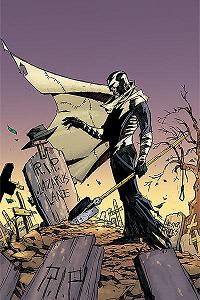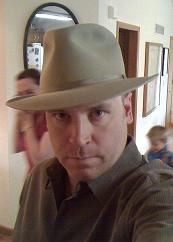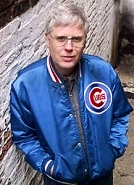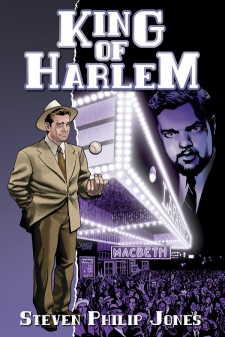When you line up the residents of planet Earth in order of charm and charisma, Ande Parks is way to the front of that line. He’s a multi-talented guy who’s made a name as one of best inkers in the business (Green Arrow, Ant-Man, Exterminators, El Diablo, etc.), and as a writer of the acclaimed graphic novels Union Station and Capote in Kansas. He’s also written comics as diverse as the superheroics of Daredevil and the political satire of Uncle Slam.
He lives in Baldwin City, Kansas (where he may be better known as a member of the local school board). Want to catch up with Ande? Your best chance is on Facebook.
Question 1: When did you first decide that you wanted to create your own comics for a living?
After a couple of pointless years of college. I only went because that’s what was expected. I had no idea what I wanted to do for a living. After a couple of years, I decided to give comics a try. I liked inking, so I got a job at Pizza Hut and started doing samples and going to shows.
Question 2: Who has had the biggest influence on you outside the comics industry, and how did they affect your life?
Something in my genes makes me stubborn and independent, and those two things are essential for making a go of it in this silly business. My dad has probably influenced me more than anyone. After that, my mom, and then my lovely wife. My wife’s support has meant more to me than just about anything in the 18 years of our marriage.
Question 3: Who has had the biggest influence on your comics career, and how has that person changed your work?
I fell in love early with Jack Kirby and Neal Adams. The biggest overall influence, though, has probably been Frank Miller. His voice pushes me to be bolder, simpler, more direct, whether I’m writing or inking.

Usually, I turn to the little bookshelves right next to my drafting table. Those shelves are full of work I love, from Neal Adams’ Batman work to lots of Kirby to the best of John Byrne. Oh, and lots and lots of Frank Miller. Also close at hand are the Kurtzman EC war books. Sometimes, when I need help writing, I’ll read some prose that I love or put in a movie with great writing; some Welles, Scorsese, or the Coen Brothers.
Question 5: Describe your typical work routine.
I try not to work more than six hours a day, by which I mean six hours actually spent at the board or writing. That doesn’t seem like a lot, but that is six hours of real concentration, and that’s about all I can muster, happily. How many hours of real concentration does the average person in the workplace pull off each day? The kids are in school now, so I try to get most of the work done during the day. I often put in some hours at night, though. I left things like all-nighters behind a long time ago — I’m too old for that nonsense.
Question 6: What writing, drawing, or other tools do you use?
I ink with Hunt 102 and Brause 511 pens, and a Raphael #3 brush. I write with Word.
Question 7: What element of your work gives you the most personal satisfaction?
Knowing that I have written a scene such that it fulfills my expectations is the greatest joy in my career. It happens very infrequently.
Question 8: What has been the most rewarding project in your professional career – in or out of comics – and why?
The four year run on Green Arrow with Hester, and Capote In Kansas. To be identified artistically with a character that Neal Adams did such incredible work on is mind-blowing. With Capote, I feel like I did a genre I love, historical fiction, about as well as I am capable of.
Question 9: We’ve all met very talented newcomers who are trying to get their first professional projects. What’s the best advice you’ve ever heard given to a promising new creator?
I don’t know where I got this, but I always tell people who come up to me at shows, saying they want to do comics, to go ahead and get busy! It’s not like you need a huge budget to make a comic. Draw it on some typing paper and head down to Kinko’s with a few bucks. Do some good work, don’t give up, and things will happen.
Question 10: Time to get philosophical: What’s the most important “big idea” that you’ve learned in life – in or out of comics – and why is it important?
Find out who you are and don’t be afraid to be that… whatever it is.
Want more? See the index of “10 Questions” interviews.
Discuss “10 Questions” in the ComicsCareer.Com Forum.
Are you a professional comics creator? Participate in the 10 Questions project.



 B. Clay Moore is a prolific writer known for a variety of projects including
B. Clay Moore is a prolific writer known for a variety of projects including 
